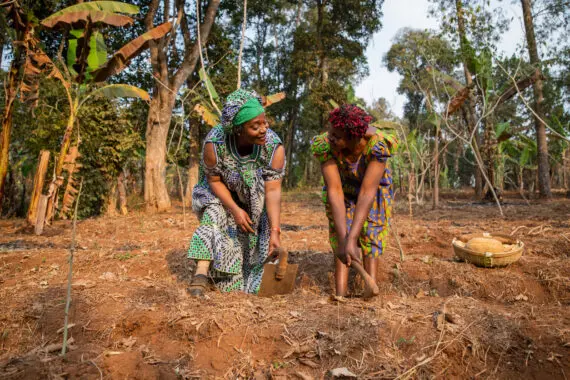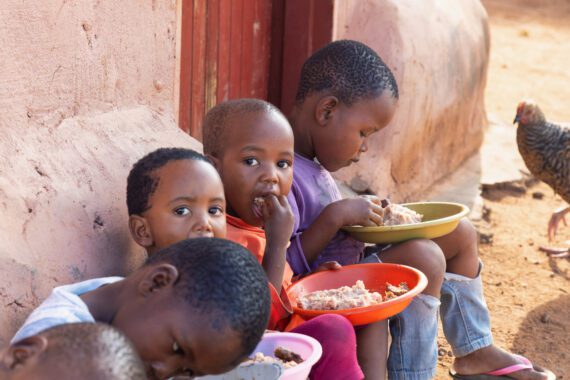By Isabel Vander Molen
April is Earth Month. This is a time to appreciate and reflect on the vast and beautiful creation that demonstrates the greatness of God. Our complex, diverse planet is equipped to nourish all people, whether they live in Arkansas or Mozambique.
Bread for the World’s mission of ending hunger in a lasting way means that we must, first, care for the environment now. Second, we must maintain and improve the health of our planet so that it can nourish its inhabitants for generations to come.
Farmers understand what is needed to maintain healthy ecosystems on and around their farms. They are among those raising the alarm over the recent cancellation of many U.S. policies, programs, and funding that seek to promote healthy ecosystems—ecosystems that are critical to food security. Beyond this, a second major concern is the risk of additional damage to essential programs in the coming months.
Disruption or elimination of support for essential federal services would have many adverse effects on food security. For example, cuts to weather advisory services means less accurate and less timely weather forecasts. Such budget cuts are already reducing access to forecasting tools such as weather balloons. Accurate information is vital to farmers. It is also particularly important to vulnerable communities, such as people who do not have access to secure shelter.
Moves to terminate environmental protections that set limits on the levels of pollutants permitted in our national water supplies threaten human lives as well as fields of crops and farm animals. Before long, polluted water begins to cause a range of illnesses, reduces the amount of food that can be grown, and weakens the nutritional status of large swaths of the population.
Farmers are already being affected by cutoffs of the funding they had been receiving under the Inflation Reduction Act. Thousands of farmers have implemented projects that will enable them to farm more sustainably, such as improving soil health through better grazing management or planting cover crops. Many could lose hundreds of thousands of dollars or be forced out of business if the reimbursements that the federal government agreed to make through the Natural Resources Conservation Service (NRCS) do not arrive. Researchers at the University of Illinois found that states such as Texas and Arkansas could bear the most significant losses if farmers are not reimbursed, upwards of millions of dollars.
Adam Chappell, who grows corn, soybeans, and rice in Arkansas, reflected on the impacts of the disruption of established contracts and the uncertainty of future funding. Chappell pointed out, “When we don’t know if we’re getting reimbursed for things that we’ve already done, bankers don’t like that. And it’s already a high-risk environment. Then when you have all that uncertainty it’s hard to get lenders onboard. And the mental aspect of it has taken a tremendous toll this last three months.” At the time of writing, NRCS funds remain paused.
The administration’s broad cuts to programs and freezes on funding have already had devastating impacts on children and families living in hunger crisis conditions. Secretary of State Marco Rubio has said that 83 percent of programs implemented by the U.S. Agency for International Development would be terminated.
Just one example of anti-hunger efforts that are now threatened is the Feed the Future Mozambique Resilient Coastal Communities Activity. The project engaged local communities in formulating plans that conserve their coastal environment while still enabling people to access sources of nutritious food such as fish, which is rich in essential nutrients.
Manuel Sansao, an agribusiness officer affiliated with the project, explains, “In the Memba community, the only activity they used to rely on to earn money was simply fishing. With the entry of the [resilient coastal communities] project, we changed the scenario to introduce more activities – we have already introduced agricultural activities aimed at providing sustenance for their families. Additionally, they can sell the agricultural produce to meet their needs.”
The project also focuses on enabling local communities to conserve the biodiversity of the coastal ecosystem so that children and future generations will have food security. Domingo Alberto, president of the Memba Community Fishing Council, remarked, “We cannot just think about ourselves when fishing… If we spoil the sea, if we fish only thinking about ourselves, our children, our grandchildren, will not know what trevally or emperor fish are.”
Food and nutrition security go hand in hand with stewarding and caring for the earth. Cuts to programs that conserve and promote the best uses of natural resources to strengthen food security will cost people and the planet both immediately and over the longer term.
The administration and Congress can make progress against hunger by recognizing that caring for the earth means caring for the health of our country and the world.
Isabel Vander Molen is a junior climate hunger policy advisor, Policy and Research Institute, with Bread for the World.



